A Brief Colonial History Of Ceylon(SriLanka)
Sri Lanka: One Island Two Nations
A Brief Colonial History Of Ceylon(SriLanka)
Sri Lanka: One Island Two Nations
(Full Story)
Search This Blog
Back to 500BC.
==========================
Thiranjala Weerasinghe sj.- One Island Two Nations
?????????????????????????????????????????????????Tuesday, October 4, 2016
Colombia and Farc scramble to rescue peace deal amid worries of return to war
Farc
leader Timochenko says ‘peace is here to stay’ and that rebels will
insist on the deal that has already been signed despite its rejection by
voters

A
man reads a newspaper announcing the results of the referendum that
surprisingly said no to the peace agreement between the Colombian
government and the Farc guerrillas. Photograph: Luis Robayo/AFP/Getty
Images
Colombia has begun grappling with the astonishing rejection by voters of a peace deal to end 52 years of war with Farc guerrillas, after a referendum on Sunday which has thrown the country into a state of confusion and uncertainty.
Reeling from the stunning defeat for the deal that took four years of
arduous negotiations to conclude, both the government and the Farc have
said they will persist in seeking peace for the country after 50.2% of
voters rejected the agreement, to 49.7% who approved it.
“Peace is here to stay,” Rodrigo Londoño, the Farc commander-in-chief known by the nom de guerre Timochenko,
said in a video statement from Havana on Monday, adding that the rebel
group’s members would not return to hostilities in a war that has cost
more than 220,000 lives and displaced more than 6 million from their
homes.
His comments echoed a speech after the results were released on Sunday
night by Colombia’s president, Juan Manuel Santos, who has staked his
presidency on the peace deal. “I will not give up.”
The no campaign, led by Santos’s arch-rival and former president Álvaro
Uribe – who has been the most stringent critic of the president and the
peace deal – has said the plebiscite results give the government a
mandate to renegotiate the accord with the Farc.
But in a hint of the difficulties to come, Timochenko indicated that the
guerrilla group would insist on the peace deal that has already been
signed. “We remain faithful to what has been agreed to,” he said.
While those who voted no continued to celebrate the outcome, those who
had been sure of a yes win could not hide their sorrow, disbelief and
concern.
“The plebiscite was magnificent because this means that the president
can’t hand over the country to the Farc on a silver platter like he
wanted to,” said Luis Bernal, 47, a doorman at a residential building in
Bogotá, echoing a common refrain of those who felt the government had
been too soft with the guerrillas in negotiations.
But César Ramos, who voted yes, said he was staggered by the outcome of
the vote. “I woke up depressed. I was so hopeful that today Colombia would be different,” said the 19-year-old university student. “Things are going to get very difficult now.”
Things have always been difficult in Corinto, a small town in Cauca
province that has lived for decades in the crossfire between the Farc
and the military. People there, as in many of the areas hardest hit by
the conflict, voted overwhelmingly for yes.
Gustavo Manrique said few people in Corinto could understand how the
rest of the country rejected the peace deal. “This shows just how
divided we are as a nation,” he said in a telephone interview from his
home. “Now we are filled with uncertainty. Will the bombs start falling
on us again? Are we going back to the bad old days?”
Both the Farc and Santos have said they will maintain a bilateral
ceasefire that has been in place since 29 August. But it is unclear how
long the truce can last in the current political atmosphere.
Santos called a meeting on Monday to discuss what comes next with
political leaders, including members of Uribe’s Democratic Centre party.
But Uribe and his followers stayed away from the meeting, and laid out
their own terms for dialogue by asking the government to name
“delegates” to talk to the no camp.
Aside from his criticism of the deal, Uribe has not made public any
concrete proposals to fix it. Andrew Reiter, a professor at Mount
Holyoke College who studies why peace treaties fall apart, said the
result of the plebiscite was a “significant blow to that country’s
prospects for peace”.
“Right now, there is still a lot of rhetoric about peace, but no one has any concrete plans about a way forward,” he said.
After the meeting, the government’s top two negotiators flew to Havana
to take stock of the political landscape in emergency talks with the
Farc leadership. Humberto de la Calle, the head of the government’s
peace delegation, offered the president his resignation, saying: “The
errors that we have committed are my responsibility alone.” Santos
rejected his offer to stand down.
Under the agreement rejected by voters, the Farc’s 5,800 fighters and a
similar number of urban militia members would have disarmed and become a
legal political party, ending the armed struggle they began in 1964
under the banner of seeking social justice. Whether or when that will
happen is unknown.
The deal would have also allowed rebel leaders to avoid jail if they
confessed to their crimes, such as killing, kidnapping, indiscriminate
attacks and child recruitment, something that many Colombians found hard
to swallow.
All the provisions of the agreement are now in limbo.
“The deal as it has been negotiated by the Santos administration is dead
and cannot be implemented,” said María Luisa Puig, an analyst with
Eurasia Group, a political risk consultancy.
